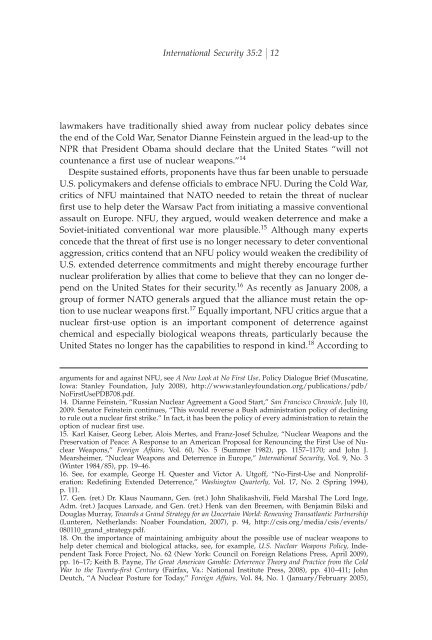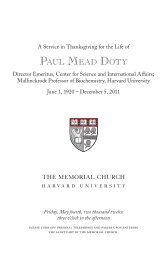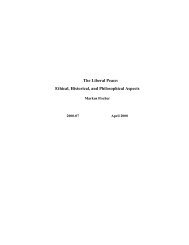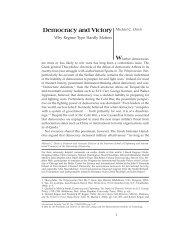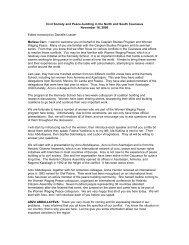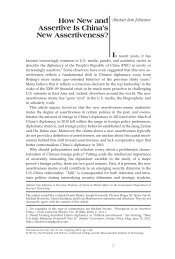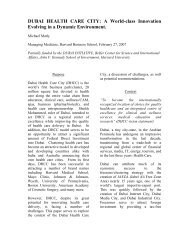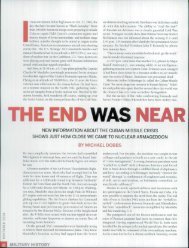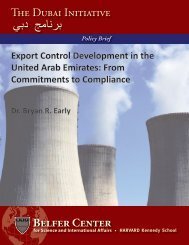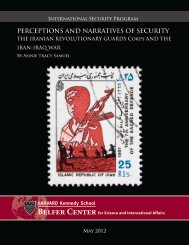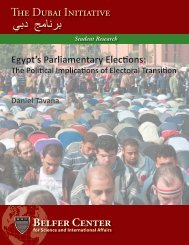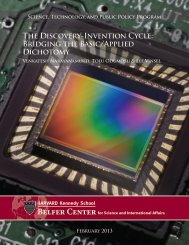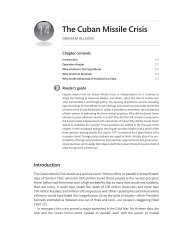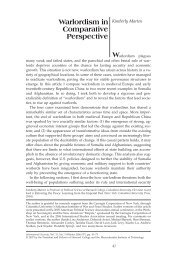The Next Step for U.S. Nuclear Policy - Project MUSE
The Next Step for U.S. Nuclear Policy - Project MUSE
The Next Step for U.S. Nuclear Policy - Project MUSE
Create successful ePaper yourself
Turn your PDF publications into a flip-book with our unique Google optimized e-Paper software.
International Security 35:2 12<br />
lawmakers have traditionally shied away from nuclear policy debates since<br />
the end of the Cold War, Senator Dianne Feinstein argued in the lead-up to the<br />
NPR that President Obama should declare that the United States “will not<br />
countenance a ªrst use of nuclear weapons.” 14<br />
Despite sustained ef<strong>for</strong>ts, proponents have thus far been unable to persuade<br />
U.S. policymakers and defense ofªcials to embrace NFU. During the Cold War,<br />
critics of NFU maintained that NATO needed to retain the threat of nuclear<br />
ªrst use to help deter the Warsaw Pact from initiating a massive conventional<br />
assault on Europe. NFU, they argued, would weaken deterrence and make a<br />
Soviet-initiated conventional war more plausible. 15 Although many experts<br />
concede that the threat of ªrst use is no longer necessary to deter conventional<br />
aggression, critics contend that an NFU policy would weaken the credibility of<br />
U.S. extended deterrence commitments and might thereby encourage further<br />
nuclear proliferation by allies that come to believe that they can no longer depend<br />
on the United States <strong>for</strong> their security. 16 As recently as January 2008, a<br />
group of <strong>for</strong>mer NATO generals argued that the alliance must retain the option<br />
to use nuclear weapons ªrst. 17 Equally important, NFU critics argue that a<br />
nuclear ªrst-use option is an important component of deterrence against<br />
chemical and especially biological weapons threats, particularly because the<br />
United States no longer has the capabilities to respond in kind. 18 According to<br />
arguments <strong>for</strong> and against NFU, see A New Look at No First Use, <strong>Policy</strong> Dialogue Brief (Muscatine,<br />
Iowa: Stanley Foundation, July 2008), http://www.stanleyfoundation.org/publications/pdb/<br />
NoFirstUsePDB708.pdf.<br />
14. Dianne Feinstein, “Russian <strong>Nuclear</strong> Agreement a Good Start,” San Francisco Chronicle, July 10,<br />
2009. Senator Feinstein continues, “This would reverse a Bush administration policy of declining<br />
to rule out a nuclear ªrst strike.” In fact, it has been the policy of every administration to retain the<br />
option of nuclear ªrst use.<br />
15. Karl Kaiser, Georg Leber, Alois Mertes, and Franz-Josef Schulze, “<strong>Nuclear</strong> Weapons and the<br />
Preservation of Peace: A Response to an American Proposal <strong>for</strong> Renouncing the First Use of <strong>Nuclear</strong><br />
Weapons,” Foreign Affairs, Vol. 60, No. 5 (Summer 1982), pp. 1157–1170; and John J.<br />
Mearsheimer, “<strong>Nuclear</strong> Weapons and Deterrence in Europe,” International Security, Vol. 9, No. 3<br />
(Winter 1984/85), pp. 19–46.<br />
16. See, <strong>for</strong> example, George H. Quester and Victor A. Utgoff, “No-First-Use and Nonproliferation:<br />
Redeªning Extended Deterrence,” Washington Quarterly, Vol. 17, No. 2 (Spring 1994),<br />
p. 111.<br />
17. Gen. (ret.) Dr. Klaus Naumann, Gen. (ret.) John Shalikashvili, Field Marshal <strong>The</strong> Lord Inge,<br />
Adm. (ret.) Jacques Lanxade, and Gen. (ret.) Henk van den Breemen, with Benjamin Bilski and<br />
Douglas Murray, Towards a Grand Strategy <strong>for</strong> an Uncertain World: Renewing Transatlantic Partnership<br />
(Lunteren, Netherlands: Noaber Foundation, 2007), p. 94, http://csis.org/media/csis/events/<br />
080110_grand_strategy.pdf.<br />
18. On the importance of maintaining ambiguity about the possible use of nuclear weapons to<br />
help deter chemical and biological attacks, see, <strong>for</strong> example, U.S. <strong>Nuclear</strong> Weapons <strong>Policy</strong>, Independent<br />
Task Force <strong>Project</strong>, No. 62 (New York: Council on Foreign Relations Press, April 2009),<br />
pp. 16–17; Keith B. Payne, <strong>The</strong> Great American Gamble: Deterrence <strong>The</strong>ory and Practice from the Cold<br />
War to the Twenty-ªrst Century (Fairfax, Va.: National Institute Press, 2008), pp. 410–411; John<br />
Deutch, “A <strong>Nuclear</strong> Posture <strong>for</strong> Today,” Foreign Affairs, Vol. 84, No. 1 (January/February 2005),


